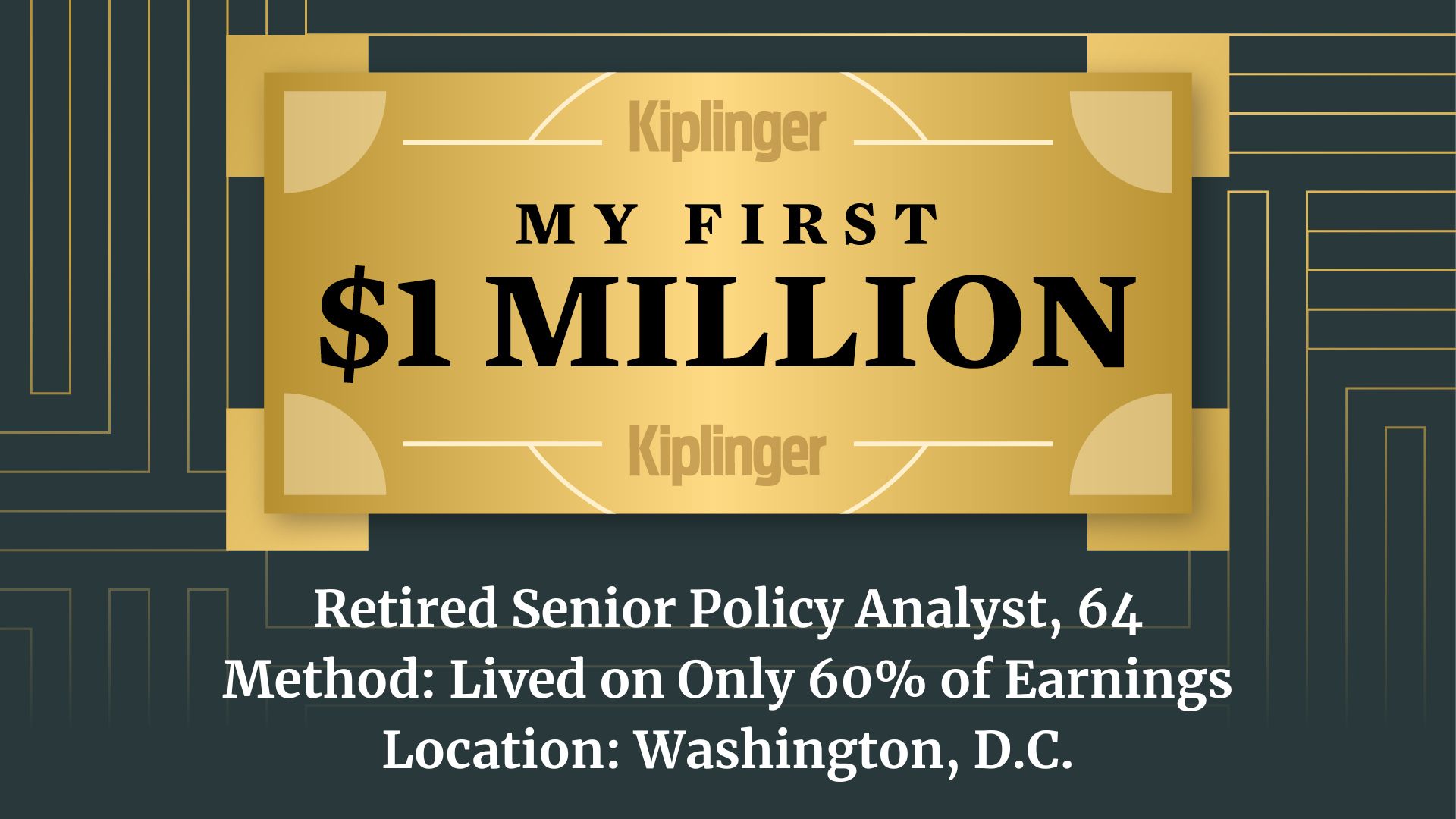See Our Best Jumbo CD Rates
The best jumbo CD rates yield returns as high as 4.35%. See our top choices.

Profit and prosper with the best of Kiplinger's advice on investing, taxes, retirement, personal finance and much more. Delivered daily. Enter your email in the box and click Sign Me Up.
You are now subscribed
Your newsletter sign-up was successful
Want to add more newsletters?

Delivered daily
Kiplinger Today
Profit and prosper with the best of Kiplinger's advice on investing, taxes, retirement, personal finance and much more delivered daily. Smart money moves start here.

Sent five days a week
Kiplinger A Step Ahead
Get practical help to make better financial decisions in your everyday life, from spending to savings on top deals.

Delivered daily
Kiplinger Closing Bell
Get today's biggest financial and investing headlines delivered to your inbox every day the U.S. stock market is open.

Sent twice a week
Kiplinger Adviser Intel
Financial pros across the country share best practices and fresh tactics to preserve and grow your wealth.

Delivered weekly
Kiplinger Tax Tips
Trim your federal and state tax bills with practical tax-planning and tax-cutting strategies.

Sent twice a week
Kiplinger Retirement Tips
Your twice-a-week guide to planning and enjoying a financially secure and richly rewarding retirement

Sent bimonthly.
Kiplinger Adviser Angle
Insights for advisers, wealth managers and other financial professionals.

Sent twice a week
Kiplinger Investing Weekly
Your twice-a-week roundup of promising stocks, funds, companies and industries you should consider, ones you should avoid, and why.

Sent weekly for six weeks
Kiplinger Invest for Retirement
Your step-by-step six-part series on how to invest for retirement, from devising a successful strategy to exactly which investments to choose.
Looking for places to store your cash to beat inflation? One risk-free option to consider is a jumbo CD. You can find jumbo CD rates up to 4.35%.
CD rates have fallen slightly after the Federal Reserve lowered interest rates three times last year. This means now is an excellent time to lock in higher rates while they're still available.
The best part about CDs? They come with fixed interest rates. Even if you lock one in and the Fed reduces rates, it won't affect your returns. I'll explain how a jumbo CD works, the best options available and how much you can earn with one.
From just $107.88 $24.99 for Kiplinger Personal Finance
Become a smarter, better informed investor. Subscribe from just $107.88 $24.99, plus get up to 4 Special Issues

Sign up for Kiplinger’s Free Newsletters
Profit and prosper with the best of expert advice on investing, taxes, retirement, personal finance and more - straight to your e-mail.
Profit and prosper with the best of expert advice - straight to your e-mail.
Top-earning jumbo CD rates for February 2026
Here are some of the top-earning jumbo CD accounts available for a range of term lengths:
Account | APY | Min. Deposit | Term |
|---|---|---|---|
4.35% | $100,000 | 12 months | |
4.05% | $50,000 | 9 months | |
4.00% | $50,000 | 12 months | |
3.90% | $100,000 | 12 months |
What is a jumbo CD?
A jumbo CD account is practically the same as a regular CD account, with one main difference — jumbo CD accounts require a higher minimum deposit to open.
Typically, most banks require a deposit of $100,000; however, this amount varies from bank to bank. You'll also have shorter maturity dates, ranging from six months to one year, although some banks offer longer terms.
Why I like jumbo CDs
There are a few reasons why I suggest savers consider a jumbo CD:
- Shorter maturity terms: Jumbo CDs don't always require you to tie up your money for years at a time. That means you'll have the flexibility of pivoting to other investments if inflation goes higher.
- A safe investment: Your account should be FDIC or NCUA insured, so your money stays safe even if your bank or credit union fails. The FDIC protects up to $250,000 in individual deposit accounts, and the NCUA protects up to $250,000 per credit union member.
- Higher rates: Jumbo CDs offer some of the best rates among CDs and savings accounts. This means that with the higher deposit requirements, you can earn more money quickly.
As you can see from the Bankrate tool below, you can earn excellent rates on these CDs:
Key considerations with a jumbo CD
A jumbo CD works like other CDs in that you must pledge to keep your money in it until its maturity date. If you decide to break it open early, you'll lose months of earned interest, which can be hundreds of dollars with a higher deposit.
Another thing to keep in mind is that many banks autorenew CDs. That means you should set a reminder on your phone's calendar a week before maturity to investigate options.
The good news is you can always let the CD autorenew. However, if the Fed cuts rates again, it will lower your earnings the next time around as the interest rate will likely be lower on the renewal than your original rate.
How much can I earn with one?
One of the benefits of a jumbo CD is that while it requires a large deposit, you're also earning more in a short window.
If you have $100,000 you're earmarking for a short-term project, like a significant home improvement, here's how much you can earn with some top accounts:
- ECFU Financial: $4,350 in earned interest for one year
- Finworth: $3,022.38 in earned interest for six months
Bottom line on the best jumbo CD rates
Jumbo CDs are an excellent option for risk-averse savers. You'll earn a guaranteed rate of return, and even if the Fed lowers rates again in the future, locking one in now won't impact you.
Remember that if you need your money before your term expires, banks charge penalties for closing your CD before your maturity date. Only buy a jumbo CD if you're confident you won't need the money before the term expires.
Related content
Profit and prosper with the best of Kiplinger's advice on investing, taxes, retirement, personal finance and much more. Delivered daily. Enter your email in the box and click Sign Me Up.

Sean is a veteran personal finance writer, with over 10 years of experience. He's written finance guides on insurance, savings, travel and more for CNET, Bankrate and GOBankingRates.
-
 Dow Loses 821 Points to Open Nvidia Week: Stock Market Today
Dow Loses 821 Points to Open Nvidia Week: Stock Market TodayU.S. stock market indexes reflect global uncertainty about artificial intelligence and Trump administration trade policy.
-
 Nvidia Earnings: Live Updates and Commentary February 2026
Nvidia Earnings: Live Updates and Commentary February 2026Nvidia's earnings event is just days away and Wall Street's attention is zeroed in on the AI bellwether's fourth-quarter results.
-
 I Thought My Retirement Was Set — Until I Answered These 3 Questions
I Thought My Retirement Was Set — Until I Answered These 3 QuestionsI'm a retirement writer. Three deceptively simple questions helped me focus my retirement and life priorities.
-
 How You Can Use the Financial Resource Built Into Your Home to Help With Your Long-Term Goals
How You Can Use the Financial Resource Built Into Your Home to Help With Your Long-Term GoalsHomeowners are increasingly using their home equity, through products like HELOCs and home equity loans, as a financial resource for managing debt, funding renovations and more.
-
 How to Find Free Money for Graduate School as Federal Loans Tighten in 2026
How to Find Free Money for Graduate School as Federal Loans Tighten in 2026Starting July 1, federal borrowing will be capped for new graduate students, making scholarships and other forms of "free money" vital. Here's what to know.
-
 My First $1 Million: Retired Senior Policy Analyst, 64, Washington, D.C.
My First $1 Million: Retired Senior Policy Analyst, 64, Washington, D.C.Ever wonder how someone who's made a million dollars or more did it? Kiplinger's My First $1 Million series uncovers the answers.
-
 Money Monsters Under the Bed? Here's What You're Really Afraid Of
Money Monsters Under the Bed? Here's What You're Really Afraid OfWhen financial anxiety keeps you awake, money isn't usually the root cause of the problem. Identifying the real demons will help you sleep — and live — better.
-
 Finances Not Going Anywhere? These 3 Steps Can Help You Find Your North Star
Finances Not Going Anywhere? These 3 Steps Can Help You Find Your North StarIf you're overwhelmed by financial planning, a long list of to-dos won't help. Find clarity by focusing on steps built around what's most important to you.
-
 Is Life Insurance Taxable When It's Paid Out?
Is Life Insurance Taxable When It's Paid Out?You received a big check from your loved one's life insurance policy. Will the IRS be expecting a check from you now?
-
 Before You Go to Costco, Try This Grocery Strategy First
Before You Go to Costco, Try This Grocery Strategy FirstA simple shift in how you plan meals could help you spend and waste less.
-
 Are You Making These 3 Savings Mistakes?
Are You Making These 3 Savings Mistakes?Avoiding these common mistakes can help you build a foundation of wealth while not leaving thousands of dollars on the table.